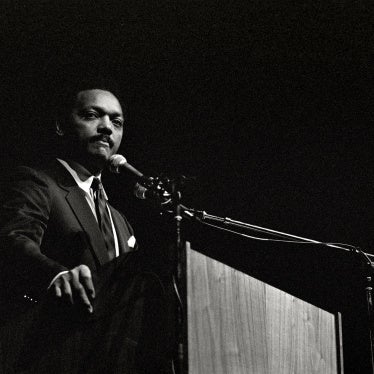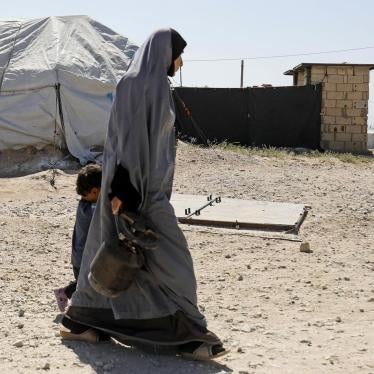(Banjul) – I have just arrived here in the Gambia, in westernmost Africa, to testify before the African Commission of Human Rights about a CIA rendition case involving Djibouti, 4,000 miles east at the mouth of the Red Sea.
The case against Djibouti was brought by Mohammed Abdullah Saleh al-Asad, a Yemeni citizen who was arrested in 2003 in Tanzania and taken on a private flight to Djibouti. There the CIA—with help from Djibouti authorities—detained him short term and then flew him to another CIA facility in Afghanistan. His petition provides evidence that he was subjected to beatings and torture in both locations. The CIA appears to have realized later that al-Asad was not involved in terrorism or al-Qaeda, and returned him to Yemen in 2005.
The al-Asad case is one of several brought to hold the US government and its co-perpetrators accountable for unlawful arrests, detentions, and interrogations carried out by the CIA during the Bush administration—serious abuses that my colleagues and I documented for Human Rights Watch in numerous reports in 2004 to present. Known CIA interrogation techniques includedsevere sleep deprivation, forced standing, exposure to cold, slapping and hitting, confining detainees in small boxes, and throwing detainees against the wall. Some were waterboarded.
The al-Asad case was documented in a report by Amnesty International in 2005. The New York University Global Justice Clinic represents him before the commission. NYU professor Meg Satterthwaite, a law school classmate of mine and long-time human rights advocate, will argue for al-Asad during the hearing alongside co-counsel Judy Oder of INTERIGHTS.
Though many attempts have been made in US courts to hold the US government to account for the CIA’s rendition, detention and interrogation program, all have failed because the US government claimed privileges under the “state secrets doctrine.” The doctrine allows courts to dismiss cases, even when they have merit, on the grounds that hearing them would ostensibly involve the disclosure of secret, or classified, information that the government claims could harm US national security.
Both the Bush and Obama administrations have opposed all efforts, inside and outside the United States, to hold CIA personnel accountable for violations of human rights law and domestic law.
Rebuffed in US courts, however, former CIA detainees have more recently brought cases in the European Court of Human Rights (ECtHR) against Poland, Lithuania, and Romania—for hosting CIA detention facilities from approximately 2002 to 2005.
In 2012, a German, Khalid el-Masri, won a judgment against Macedonia on torture claims in the ECtHR. In 2004 he was taken from Skopje to Kabul on a CIA aircraft, interrogated there, and later released when it emerged he had been detained in a case of mistaken identity. Two former detainees have also won a decision against Sweden by the U.N. Committee Against Torture for allowing the CIA to render two suspects to Egypt, where they were tortured.
Human Rights Watch was the first group, in November 2005, to connect Poland and Romania to the CIA’s secret prisons program. We have released several other reports on renditions involving Pakistan, Jordan, and Libya. We continue to push Poland, Romania, and Lithuania to carry out independent and thorough investigations. Polish prosecutors have had a case open for years, but have not indicted anyone.
Italy is the only European country where courts have tried and convicted US citizens and nationals for unlawful rendition to torture. In September 2012, the highest criminal court upheld the in absentia convictions of 23 US citizens—22 CIA agents and an Air Force Colonel—for the 2003 rendition of an Egyptian cleric to Egypt. In February 2013, the Milan Appeals Court convicted in absentia three more CIA agents and five Italian intelligence officers.
Authorities in other countries reported to have had CIA facilities—Morocco, Thailand, and Afghanistan—have shown no interest in carrying out investigations, whether criminal or parliamentary.
With most avenues blocked in the US and limited opportunities available elsewhere, the al-Asad case in Africa, and the others in Europe, represent for now the only hope that people abused in CIA custody will get justice or that the US government and its partners will be held accountable for their actions. If successful, these cases may also serve to deter the CIA and other countries from committing these egregious abuses in the future.
John Sifton is an advocacy director at Human Rights Watch.









